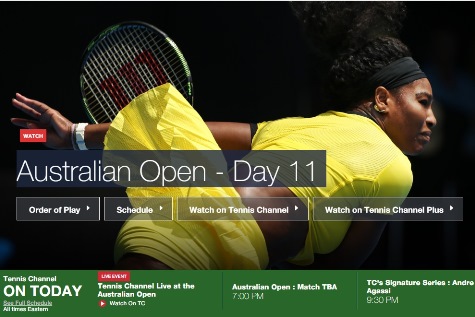Sinclair Found 'Right Fit' To Expand Into Cable
The smarter way to stay on top of the multichannel video marketplace. Sign up below.
You are now subscribed
Your newsletter sign-up was successful

Sinclair Broadcast Group wanted to add cable network ownership to its business mix and decided, after exploring concepts with distributors, that buying Tennis Channel and bundling it into retransmission-consent deals would be "a palatable ask on our part," Sinclair executive vice president and general counsel Barry Faber said after Sinclair said it reached a definitive agreement to buy the channel for $350 million.
Sinclair declared that it had already reached agreements with pay-TV providers -- cable, satellite and telco-TV distributors -- to add 20 million homes to the channel's current base of around 30 million homes. Faber said on a conference call with reporters those gains would come over the course of about a year after the deal closes, which is expected to happen soon.
Sinclair, which Faber said owns or serves some 170 TV stations reaching 40% of the country, has "a couple of major [distributor deals] left, very major ones" yet to be completed, he added. One of those is with Comcast, the biggest U.S. cable company and one of Tennis Channel's largest distributors. Comcast also has been in very public disagreements over several years with Tennis Channel over how widely the network should be distributed. Comcast also is a "huge and trusted customer" of Sinclair, Faber said, adding he was "extremely hopeful and somewhat confident that we will be able to find an alternate solution that will eliminate the need for litigation” in the ongoing disagreements over Tennis Channel's distribution.
Sinclair's current retransmission deal with DirecTV, the biggest U.S. pay-TV provider overall, was done in February 2013 and might well be running out soon as most of its retransmission deals have been for three years. Sinclair did a new retransmission deal with Dish Network in August, and during those talks it was reported that Dish complained about being asked to add cable-network distribution as part of the deal, Faber said. He said Sinclair was happy with the way the deal with Dish eventually worked out.
Faber and Tennis Channel chairman and CEO Ken Solomon said distributors weren't likely to give the channel many more homes unless they had good reason to. But distributors see value in the channel, which has a clear identity, shows live events and appeals to fans of the sport. When the channel offers distributors the chance to air it for free during major tournaments, such as the current Australian Open, it expands beyond 50 million homes and its ratings go up, Solomon said.
"We found this to be a path where their resistance wasn’t nearly as high as if we had taken some other strategies into cable," Faber said, "so I anticipate having some great success going forward. And we have room to grow this well past the 50 million homes that we currently have commitments for.”
Faber said he did not think Sinclair had to give in at all on how much cash it's paid for retransmitting its stations by including Tennis into the deals. “I do not believe that this is simply a shifting of money around,” he said.
The smarter way to stay on top of the multichannel video marketplace. Sign up below.
Other points from the call:
-- Tennis Channel's investors -- listed on the channel's website as including Apollo Capital, Bain Capital Ventures, DND Partners, Battery Investors, Columbia Capital and Frank J. Biondi Jr.'s Waterview Advisors -- were willing to continue to back the nearly 13-year-old channel as an independent entity and didn't force a sale, Solomon said. “This was a 'we will serve no wine before its time' scenario,” he said. But the channel had hit a wall in terms of distribution, and could not compete for some major event rights because of it. "We can't play for finals of a major," he said. The channel was long overdue for the right partner, which for Solomon was “somebody who recognizes the inherent value of the asset that we built and who can bring real strategic resources to growing it and scaling it to the next level.”
-- Sinclair continues to like owning broadcast TV stations, especially as retransmission-consent cash has developed as a solid revenue stream in addition to advertising dollars. But as the company stepped up investments in programming it saw an advantage to having control over how that content was used, and decided it wanted to build or buy and grow a cable network, Faber said. The idea first sprang out of the acquisition of Allbritton Communications, which owns a local news channel in the Washington, D.C., market. Sinclair also has been getting into more sports programming -- Ring of Honor wrestling and event syndication through the American Sports Network -- and recently launched a sci-fi channel, Comet, on multicast spectrum in partnership with MGM. Sinclair will “continue to be open to exploring opportunities” to own or partner on cable programming, Faber said.
-- Solomon and the existing Tennis Channel management are very much part of the deal, both executives said. “I am not only staying I am committed to staying, excited to stay and I can’t wait for what’s next,” Solomon, a longtime TV manager and entrepreneur, said.
-- Possibly the only big multichannel distributor that Sinclair stations don't overlap, Faber said, is Long Island, N.Y.-based Cablevision Systems, which doesn't carry Tennis Channel.
Mike Farrell contributed to this story.
Kent has been a journalist, writer and editor at Multichannel News since 1994 and with Broadcasting+Cable since 2010. He is a good point of contact for anything editorial at the publications and for Nexttv.com. Before joining Multichannel News he had been a newspaper reporter with publications including The Washington Times, The Poughkeepsie (N.Y.) Journal and North County News.

